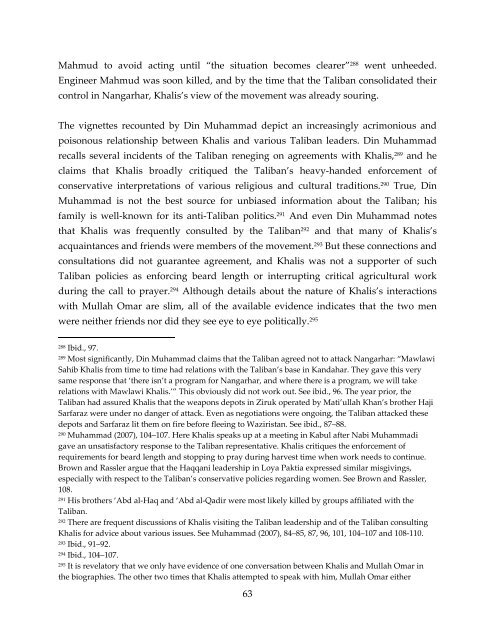Usama bin Ladin’s “Father Sheikh”:
Usama bin Ladin’s “Father Sheikh”:
Usama bin Ladin’s “Father Sheikh”:
Create successful ePaper yourself
Turn your PDF publications into a flip-book with our unique Google optimized e-Paper software.
Mahmud to avoid acting until “the situation becomes clearer” 288 went unheeded.<br />
Engineer Mahmud was soon killed, and by the time that the Taliban consolidated their<br />
control in Nangarhar, Khalis’s view of the movement was already souring.<br />
The vignettes recounted by Din Muhammad depict an increasingly acrimonious and<br />
poisonous relationship between Khalis and various Taliban leaders. Din Muhammad<br />
recalls several incidents of the Taliban reneging on agreements with Khalis, 289 and he<br />
claims that Khalis broadly critiqued the Taliban’s heavy‐handed enforcement of<br />
conservative interpretations of various religious and cultural traditions. 290 True, Din<br />
Muhammad is not the best source for unbiased information about the Taliban; his<br />
family is well‐known for its anti‐Taliban politics. 291 And even Din Muhammad notes<br />
that Khalis was frequently consulted by the Taliban292 and that many of Khalis’s<br />
acquaintances and friends were members of the movement. 293 But these connections and<br />
consultations did not guarantee agreement, and Khalis was not a supporter of such<br />
Taliban policies as enforcing beard length or interrupting critical agricultural work<br />
during the call to prayer. 294 Although details about the nature of Khalis’s interactions<br />
with Mullah Omar are slim, all of the available evidence indicates that the two men<br />
were neither friends nor did they see eye to eye politically. 295<br />
288 Ibid., 97.<br />
289 Most significantly, Din Muhammad claims that the Taliban agreed not to attack Nangarhar: “Mawlawi<br />
Sahib Khalis from time to time had relations with the Taliban’s base in Kandahar. They gave this very<br />
same response that ‘there isn’t a program for Nangarhar, and where there is a program, we will take<br />
relations with Mawlawi Khalis.’” This obviously did not work out. See ibid., 96. The year prior, the<br />
Taliban had assured Khalis that the weapons depots in Ziruk operated by Mati’ullah Khan’s brother Haji<br />
Sarfaraz were under no danger of attack. Even as negotiations were ongoing, the Taliban attacked these<br />
depots and Sarfaraz lit them on fire before fleeing to Waziristan. See ibid., 87–88.<br />
290 Muhammad (2007), 104–107. Here Khalis speaks up at a meeting in Kabul after Nabi Muhammadi<br />
gave an unsatisfactory response to the Taliban representative. Khalis critiques the enforcement of<br />
requirements for beard length and stopping to pray during harvest time when work needs to continue.<br />
Brown and Rassler argue that the Haqqani leadership in Loya Paktia expressed similar misgivings,<br />
especially with respect to the Taliban’s conservative policies regarding women. See Brown and Rassler,<br />
108.<br />
291 His brothers ‘Abd al‐Haq and ‘Abd al‐Qadir were most likely killed by groups affiliated with the<br />
Taliban.<br />
292 There are frequent discussions of Khalis visiting the Taliban leadership and of the Taliban consulting<br />
Khalis for advice about various issues. See Muhammad (2007), 84–85, 87, 96, 101, 104–107 and 108‐110.<br />
293 Ibid., 91–92.<br />
294 Ibid., 104–107.<br />
295 It is revelatory that we only have evidence of one conversation between Khalis and Mullah Omar in<br />
the biographies. The other two times that Khalis attempted to speak with him, Mullah Omar either<br />
63


